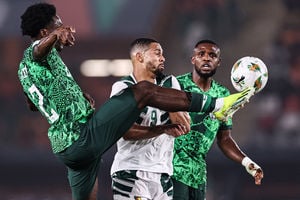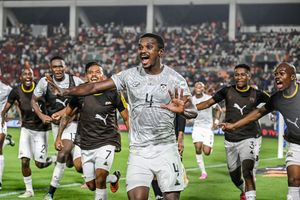
Cape Verde's players celebrate after the victory at the end of their Africa Cup of Nations (CAN) 2024 round of 16 match against Mauritania at the Felix Houphouet-Boigny Stadium in Abidjan on January 29, 2024.
Cape Verde’s Blue Sharks are set to play against South Africa (11 pm Kenyan time) in the Africa Cup of Nations (Afcon) quarter-finals tonight in a match historic for the tiny nation.
“The 2013 team also did well (they reached the quarter-finals), but this is one of the strongest in Cape Verde,” José Yekenha a football pundit told Nation Sport in Luanda on Friday.
Clearly, Cape Verde has more chances to win the game, Yekenha said, recalling the history of matches between the two teams.
In the head-to-head with the South Africa’s Bafana Bafana, Cape Verde has the upper hand, with two wins (1-2 and 2-1) and a 0-0 draw in a match held in South Africa for the Afcon 2013.
Outshone powerhouses
The other two clashes took place in 2017 and were the African qualifying matches for the 2018 World Cup.
But to reach the Afcon 2023 quarter-finals, the Blue Sharks, whom the Confederation of African Football (Caf) termed on Wednesday as one of the sensations in this event, emerged the winner of Group ‘B’ with seven points.
They outshone powerhouses Egypt and Ghana, both highly-ranked and considered among the favourites to raise the continental trophy, and of course Mozambique.
In the round of 16, the Blue Sharks knocked out Mauritania in a late captain Ryan Mendes penalty, making it the first time ever for them to win an Afcon knockout tie. With this goal, Ryan Mendes became the Blue Sharks’ all-time top scorer with 17 goals.
“If Cape Verde continues to play as it has become accustomed to, it will beat South Africa,” Yekenha added.
But, what are the reasons behind the success of Cape Verde football team in the Afcon 2023?
One of Cape Verde’s assets is its diaspora, which is widely-known as patriotic.
In fact, there are large Cape Verdean communities spread across countries such as the United Kingdom, Portugal, France the Netherlands and the US, among others.
Cape Verde is the only team in Afcon 2023 with 24 players picked from 24 different clubs based in 16 countries, with only defender Ianique dos Santos Tavares being a home-based club player. Four players selected for this year’s tournament are from the Netherlands by birth and defender Roberto Lopes was born in Ireland from Cape Verdean parents.
Compared to the Afcon 2013, some 18 out of the 23 players in the squad were born in Cape Verde. According to a SuperSport journalist, in many ways, Cape Verde is like a modern cosmopolitan club.
“While many national teams are made up of players from similar backgrounds and cultures, Cape Verde is more cosmopolitan,” Henrique Aly wrote in Lance, a Mozambique online sport newspaper.
Historically, according to the United Nations, for years, Cape Verde has been a country of emigration. The number of Cape Verdeans living abroad was estimated to be double the number of domestic residents (700,000 Cape Verdeans live abroad, mainly in the United States (260,000) and Europe (including 100,000 people in Portugal).
The situation has changed recently with an increasing number of immigrants arriving in Cape Verde, the UN also said, adding that the diaspora returning to the country have become more involved in its development.
Cape Verde has a collective group, it is a family as its players always say.
This team has resilience and likes to pass the ball around. They like to attack at all costs, at all times, Marco Martins, a RFI Journalist in Portuguese analysed.
Another key to the team’s unity and success seems to be the Cape Verdean Creole, a language which is the mother tongue of nearly all the population of the country.
Creole dominant language
“Creole is the dominant language in the squad,” defender Roberto Lopes told the Cape Verde state TV TVC in an interview last year.
After their victory against Mauritania on Monday, Cape Verdean players were seen in widely circulated videos on social media celebrating with local music in Creole and the Funaná dance.
Along with Morna, Funaná, is a well-known Cape Verdean music style.
After the victory over Mauritania, actor João Pereira, aka Tikai, composed a song overnight to ask for support for the national team.
“Tubarons Dentu Nota” (Sharks in tune) is the title of the Funaná and the video clip was shot at the National Stadium, the home of the Blue Sharks.
Meanwhile, in Africa, politics has a powerful relationship with sports.
There are instances on the continent where politicians have had a say in the choice of players for their national teams.
Unity and affection
In Cape Verde, this doesn’t appear to be the case as the country always stands out for good in rankings of democracy, transparency, human rights and good governance, and their leaders are known for paying special attention to their country’s nationals.
On Tuesday, the Cape Verde Presidency confirmed that President José Maria Neves, who has not travelled to Côte d’Ivoire beforehand following the death last week of the First Lady’s mother, will support his national football team from the stands on Saturday.
According to the statement, the head of state is delighted with the unity and affection that Cape Verdeans in the country, and in the vast diaspora, have shown towards the national teams in these high-profile African competitions.
He also urged everyone to continue with the same, positive wave, in an important contribution to their victors continuing to win.







